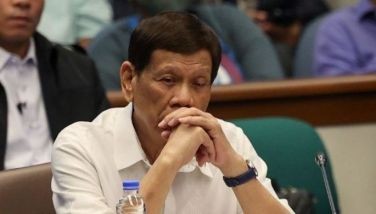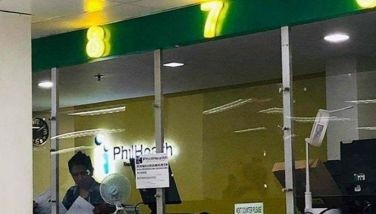Arroyo wages war on illegal drugs

July 11, 2001 | 12:00am
There’s no compromising in the war against illegal drugs.
President Arroyo has issued a letter of instruction (LOI) outlining the government’s campaign to stamp out the growing lucrative illegal drug trade in the country.
The power to issue LOIs has long been unused, and was popular during the regime of the late dictator Ferdinand Marcos.
LOI No. 1, dated July 4, contains specific instructions on how Mrs. Arroyo’s administration intends to deal with the drug scourge.
"The drugs menace has become the Public Enemy No. 1 of the entire Filipino people as well as the No. 1 threat to the national security of our country," it stated.
"This LOI seeks to mobilize and bring to bear the entire government machinery and the civil society in the all-out and sustained anti-drug campaign nationwide towards the attainment of a drug-free Philippines in 2010," it explained.
The LOI, addressed to national government agencies, local government units, government owned and controlled corporations, as well as participant non-government organizations in the first anti-drug summit earlier this year, takes effect immediately.
A feature of this war against drugs is the Anti-Money Laundering Task Force (AMLTF) which is to lead in the prevention and control of the financing link of the drug chain.
This was the second time that Mrs. Arroyo used a decree reminiscent of the Marcos years. The first was when she issued General Order No. 1 last May declaring a state of rebellion in Metro Manila following the May 1 riots around the Presidential Palace.
Former Presidents Joseph Estrada, Fidel Ramos and Corazon Aquino never invoked such powers which were commonplace during the Marcos’ martial law regime, a Palace legal staffer said.
In issuing LOI No. 1, the President said the number of drug users "have increased at an alarming rate of about 300 percent per annum from only 20,000 in 1972 to about 1.7 million regular users plus 3.5 million casual users nowadays."
She said drug incidence has worsened despite the efforts of the Dangerous Drugs Board and the erstwhile Constabulary Anti-Narcotics Unit (CANU), precursor of the PNP Narcotics Group, which was previously the Narcotics Command.
"The estimated value of illicit dug trade is now about P250 billion - P300 billion per annum, 95 percent of which is in methamphetamine hydrochloride or shabu being sourced from China, thereby resulting in billions of dollars worth of much-needed and hard-earned foreign exchange going down the drain," the LOI said.
The letter further stated that drugs cause 70 percent of heinous crimes, clogging the court dockets and jails with as many as 20,000 cases a year.
"The drug syndicates are now unlevelling both the economic and political playing fields, by investing their dirty money in business that could readily drive out competition the legitimate businessmen who are investing in legitimately earned and borrowed money," it added.
The syndicates even have the temerity to link up with political kingpins to smoothen the conduct of business, the LOI said.
Under the LOI, all NGAs and GOCCs are authorized to appropriate and utilize two percent of their respective budgets in the anti-drugs campaign.
President Arroyo has issued a letter of instruction (LOI) outlining the government’s campaign to stamp out the growing lucrative illegal drug trade in the country.
The power to issue LOIs has long been unused, and was popular during the regime of the late dictator Ferdinand Marcos.
LOI No. 1, dated July 4, contains specific instructions on how Mrs. Arroyo’s administration intends to deal with the drug scourge.
"The drugs menace has become the Public Enemy No. 1 of the entire Filipino people as well as the No. 1 threat to the national security of our country," it stated.
"This LOI seeks to mobilize and bring to bear the entire government machinery and the civil society in the all-out and sustained anti-drug campaign nationwide towards the attainment of a drug-free Philippines in 2010," it explained.
The LOI, addressed to national government agencies, local government units, government owned and controlled corporations, as well as participant non-government organizations in the first anti-drug summit earlier this year, takes effect immediately.
A feature of this war against drugs is the Anti-Money Laundering Task Force (AMLTF) which is to lead in the prevention and control of the financing link of the drug chain.
This was the second time that Mrs. Arroyo used a decree reminiscent of the Marcos years. The first was when she issued General Order No. 1 last May declaring a state of rebellion in Metro Manila following the May 1 riots around the Presidential Palace.
Former Presidents Joseph Estrada, Fidel Ramos and Corazon Aquino never invoked such powers which were commonplace during the Marcos’ martial law regime, a Palace legal staffer said.
In issuing LOI No. 1, the President said the number of drug users "have increased at an alarming rate of about 300 percent per annum from only 20,000 in 1972 to about 1.7 million regular users plus 3.5 million casual users nowadays."
She said drug incidence has worsened despite the efforts of the Dangerous Drugs Board and the erstwhile Constabulary Anti-Narcotics Unit (CANU), precursor of the PNP Narcotics Group, which was previously the Narcotics Command.
"The estimated value of illicit dug trade is now about P250 billion - P300 billion per annum, 95 percent of which is in methamphetamine hydrochloride or shabu being sourced from China, thereby resulting in billions of dollars worth of much-needed and hard-earned foreign exchange going down the drain," the LOI said.
The letter further stated that drugs cause 70 percent of heinous crimes, clogging the court dockets and jails with as many as 20,000 cases a year.
"The drug syndicates are now unlevelling both the economic and political playing fields, by investing their dirty money in business that could readily drive out competition the legitimate businessmen who are investing in legitimately earned and borrowed money," it added.
The syndicates even have the temerity to link up with political kingpins to smoothen the conduct of business, the LOI said.
Under the LOI, all NGAs and GOCCs are authorized to appropriate and utilize two percent of their respective budgets in the anti-drugs campaign.
BrandSpace Articles
<
>
- Latest
- Trending
Trending
Latest
Trending
Latest
Recommended
March 23, 2025 - 12:00am






























